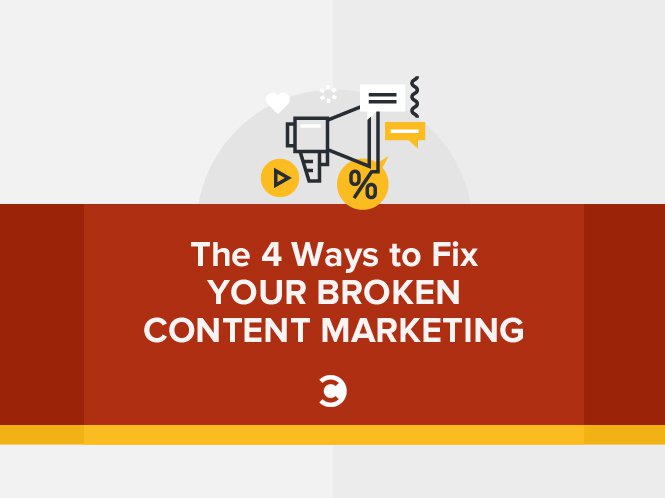As more and more (and more) content is created, the performance of the average piece of content is plummeting. There is no shortage of content about content marketing, either. Yet, when content doesn’t work, many marketers are perplexed. Perhaps they’ve been lulled into a false sense of, “If I write it, they will come?” Or maybe most content marketers simply don’t have a background in testing and optimization? (Fun fact: That’s why this company and site are called “Convince & Convert.” My plan was originally to make this a conversion rate optimization consultancy, as we did a lot of that at my prior firm, Mighty Interactive.) Certainly, the specific changes you can make to improve the performance of your content marketing are nearly limitless. But realistically, all of them fall into one of these, the 4 Ways To Fix Broken Content Marketing. Fix Your Content Marketing Topic You are competing against EVERYTHING with your content, not just your competitors. Content is consumed as a mixture of personal and commercial updates, like an information smoothie that combines Trump, each and every Kardashian, reminders from Mom, and whatever you’re trying to tell your customers. It’s daunting. If your content isn’t working, maybe what you’re creating content ABOUT is off-base? Remember, if your content solely talks about your company, its products, and the corresponding features and benefits, you don’t really have a content marketing initiative; you have an episodic brochure. Kim Kardashian was robbed of all of her jewels. Your bullshit blog post about your new product doesn’t stand a chance. Ultimately you have two paths for your content marketing topics, and you should pursue both. First, make SURE you create content that addresses known or inferred customer questions. If you don’t have—by far—the best FAQ in your industry, you’re forgetting the […]
How Outlines Hone Your Content and Improve Your Writing
Copywriting comes naturally for some marketers—yet for many others, writing can feel like absolute torture. It’s no surprise, really. Writing succinctly and persuasively is an acquired skill that often requires endless hours of think-tanking, talking to oneself, brief moments of insatiable insanity, and a handful of untimely swear words. Meld the time it takes to write well with all of the competing pressures and tasks that a marketer juggles on a daily basis, and you have a recipe for frustration. Learn how to create a strong outline to improve the direction of your content, open the door for team collaboration, and transform your writing into a more polished product that drives audience engagement and results for your marketing team. Clarify Strategic Direction Before Executing Content Whether creating ad copy, email nurture, landing pages, or an eighty-page ebook, knowing where to start and how your campaigns will affect your business goals is often a challenging guessing game. Too many marketers discover a strategic direction for their content efforts mid-way through a project , or it’s an afterthought entirely. It’s even common to approach content with a “get-er-done” attitude with intentions to save time, execute quickly, and test multiple variables; however, this mindset can lead to sloppy content execution and be an expensive lesson to learn. This typically means poor content performance, misaligned brand messaging, or an underwhelming audience sentiment that could damage your marketing campaigns. The key to avoiding this is slowing down your content efforts , even if it’s just by an hour or two, to narrow your focus and strategic direction in an outline. Creating an outline for your content can help both you and your team collaborate on the specific purpose of your content, the type of research or sources needed to support the content, and how […]
6 Ways to Energize Your Content Marketing Team (and Your Content)
Nearly half of B2C businesses have small content marketing teams supporting the organization. Yet, 73% of businesses will produce more original content in the coming year, which means content teams will spend more time keeping the engine running with little time or headspace for innovation. While boosting the size of your team might seem like an obvious solution, it’s expensive. If you really want to improve your team’s ability to produce quality content, you better protect their opportunity for creativity. Here are six ways to help your team create more amazing content and improve your content marketing program in unexpected ways. 1. Aim for more creative, less standardized process Adobe’s State of Create 2016 survey confirms that 73% of workers today feel increasing pressure to be productive versus being creative at work. Of course, there are always deadlines to meet, but if your team members don’t have space to think, experience diversity of thought, or have the ability to engage in new experiences, their creativity will suffer. A recent study showed that unfamiliar experiences can contribute to a 50% increase in creativity. Even small changes in one’s environment can provide a boost including lowering the lights , adding some ambient noise , or even just taking a walk . As the leader, you want your team knowing they have the freedom to do what’s needed to conjure their muse. Remember, your team will follow your lead, so show them how you change your environment to fan your own creativity. 2. Encourage more risk-taking When you’re focused on getting the next piece of content to market by deadline, it’s easy to shy away from trying new things. Untested ideas carry the risk of your team not hitting goals, so it feels safer to go with the tried and trusted. Yet, […]
5 Vendors Explain What Makes Their Digital Marketing Hub Unique
Not all ducks — or digital marketing hubs — are identical. Leading analyst firms like segment vendors into various categories, from leaders to the also-rans. But is the top rated vendor necessarily the right vendor for you? In a recent Magic Quadrant on digital marketing hubs (DMH), for example, Gartner named four leaders: Adobe, Oracle, Salesforce and Marketo. Gartner said digital marketing hubs provide marketers and applications "with standardized access to audience data, content, workflow triggers and operational analytics to automate execution and optimization of multichannel campaigns, conversations, experiences and data collection across online and offline channels.” Those capabilities are often complementary to native applications within a marketing cloud or suite. “Extensibility through published services,” Gartner researchers added, “is a key benefit of this technology.” We decided to find out what’s under the hood of some of the vendors recognized in the Gartner digital marketing hubs report — and give company representatives an opportunity to explain why their company’s platform is the best to use. What makes your digital marketing hub unique? The Answers Cory Munchbach, VP, Marketing, BlueConic Cory Munchbach Munchbach oversees inbound, outbound and all other marketing and associated activities. Before joining BlueConic , she was an analyst on the customer insights practice at Forrester , covering the intersection of marketing strategy and technology and an expert in the marketing technology landscape. Tweet to Cory Munchbach . Gartner succinctly nailed what differentiates the BlueConic digital marketing hub, which is that our technology is a customer data platform (CDP) — and the only one so identified by the MQ’s authors in the report. According to the founder of the CDP Institute , a CDP is a “marketer-managed system that creates a persistent, unified customer database that is accessible to other systems.” There are parallels between a CDP and […]
26 Lessons From Social Media Marketing World 2017
Forget Paris, I love San Diego in the springtime. I particularly love the Social Media Marketing World event. It is a great chance to catch up with friends in the sunshine and to learn from the best experts in the field of social media marketing. I was furiously scribbling notes throughout the event and here are some of my top takeaways. 1. Facebook is the most important marketing platform Mike Stelzner revealed the results of Social Media Examiner’s latest survey of 5,000 marketers. Two thirds of marketers say Facebook is their most important platform although they acknowledge reach has declined. 2. LinkedIn is still key for B2B marketers The second most important platform in the SME study was LinkedIn. There are also signs that people are spending more time in their LinkedIn feed and sharing a lot more on LinkedIn. There are now 450m members on LinkedIn but importantly it is estimated there are 40m decision makers on the platform. See Susan Moeller’s post on LinkedIn trends that all marketers should be aware of. 3. Twitter is still a great connecting tool Whilst shares via Twitter appear to be in decline the platform remains a great tool for connecting people and driving traffic. Ian Anderson Grey said during his session that Twitter is still the main driver of traffic to his blog. Madalyn Sklar’s secret sauce for Twitter Madalyn Sklar also talked to the power of Twitter and how many of her influencer relationships originally started on Twitter. However, both Ian and Madalyn emphasised the importance of engagement on Twitter and not simply broadcasting. Madalyn focused on the power of Twitter chats as a way to connect and as a place to showcase your expertise and influence in a topic area. Participating in twitter chats allows you to: Connect […]
How to Blast Away the Top 15 Conversion Roadblocks on Your Website
Conversion rate optimization has never been bigger than it is today. Just look at how much interest in conversion rate optimization has increased over the past decade: And there are more and more conversion rate optimization (CRO) agencies popping up every day. A quick search on Google for “conversion rate optimization agency” gave me nearly one million results: This tells me one thing: many companies have lousy conversion rates. According to Econsultancy , “only about 22 percent of businesses are satisfied with their conversion rates.” So, what’s going wrong? The issue with CRO is that there is a plethora of potential problem areas. It’s not always easy to pinpoint precisely where the issue lies. But based on my experience and research, there are 15 primary conversion roadblocks that disrupt the process and turn would-be customers away. If your conversions aren’t where they should be, it’s very possible that at least one of these issues is the culprit. In this post, I describe these problem areas and offer advice on how to fix them. I’ll start with the more technical aspects and work my way down to onsite content and, ultimately, the checkout process itself. 1. Slow load time Before you can ever spark initial interest, you must get visitors to actually browse through your site. If they abandon your site before it loads, you’re guaranteed to have a zero percent conversion rate. Not good. Quite honestly, slow load time is an issue that still plagues many companies today, and that’s because people have little patience. Here’s what I mean. Research has found that “nearly half of web users expect a site to load in 2 seconds or less, and they tend to abandon a site that isn’t loaded within 3 seconds.” In the case of website conversions, a lack […]
28 Business-Boosting Marketing Activities You Can Do in 1 Hour or Less
The entrepreneurial lifestyle is often a hectic one. Some “treps” easily end up working 50, 60, or even more hours per week. Don’t get me wrong. I love almost everything about running my businesses and blogs, but time is definitely at a premium. And I’m sure many of you know exactly what I’m talking about. Sometimes there are just not enough hours in the day to spend on an extensive, exhaustive marketing campaign. But you know what? There are a lot of marketing activities that can get legitimate results that you can do in 1 hour or less. I came up with 28 specific activities you can do in your downtime but which will still give your business a nice boost. Here we go. 1. Create an editorial calendar Almost any great blog begins with a detailed editorial calendar. This is where you coordinate your content, schedule your posts, set deadlines, list your CTAs, and so on. In other words, an editorial calendar provides structure to your blogging campaign and keeps things from getting messy. Honestly, this is the only way I’m able to stay on top of my game (and maintain sanity) with all of my different projects. I recommend checking out this list of editorial calendar templates from Builtvisible for more. 2. Tweak your editorial calendar You should also know that an editorial calendar is never static. A good one is dynamic, ever-changing. If you haven’t checked your editorial calendar in a while, look it over and make any necessary adjustments. For instance, you might: Check off posts that have been completed Add new content to create over the next month Look for ways to make it more organized 3. Read three industry blog posts I really recommend staying on top of industry trends. This is your […]
Why Google’s SEO advice is NOT (always) in your best interest
Last month, Google released a video detailing best practices for hiring an SEO company , and it is positioned to become the go-to guide for hiring an SEO. After all, who better to tell companies what they should look for in an SEO than the operators of the world’s most popular search engine? The advice in the video is useful, but it’s biased and incomplete — like so much of the information the company distributes. For example, Ohye states that valid recommendations from an SEO must be corroborated by official Google statements, but the search giant frequently declines to comment on algorithm updates, and they have also been known to advise what they want SEOs to do — not necessarily what works. Reputable SEO companies seriously consider all official statements that Google makes about its ranking factors. But if Google is an SEO company’s only source of data and best practice information, the results of the SEO’s work are likely to be suboptimal. Whether you’re trying to hire an SEO company or improve your own SEO strategy in general, remember a few things about Google: their word is not always their bond, their data is deliberately incomplete, and they are a for-profit company. Some opinions expressed in this article may be those of a guest author and not necessarily Marketing Land. Staff authors are listed here . Learn to craft remarkable customer experiences Join us at MarTech San Francisco May 9-11 and tackle digital transformation at the intersection of marketing, technology, and management. Only MarTech blends graduate-level marketing, technology and management topics designed to help you succeed in this software-powered marketing world. Register now . About The Author
How Do Consumers Really Feel About 2017’s Digital Trends? [Infographic]
As we approach the year’s second quarter, Google is already returning over 46,600 results for “ digital trends 2017 .” And if you’re in the digital marketing space, there seems to be an unspoken rule that you must always have an opinion on what the key trends will be for the year ahead. But could it be that we’re all stuck in an industry echo chamber? As it turns out, some new research from Code Computerlove might burst that bubble. Code Computerlove surveyed 1,000 U.K. adults to find out what they really think about these trend predictions — things like voice search, virtual reality, and chat-bots. That data was then compared to what’s actually making the most noise online. Some key findings included: Mobile payments are the most sought-after technology in 2017. 9 out of 10 consumers claim to have no interest in using augmented reality in the near future. 1 in 5 people surveyed aim to spend less time in front of screens this year. With that many people aiming to spend less time in front of screens this year, brands have to make their digital interactions count — a poor initial digital experience can carry a long-term impact. Curious to know what else your brand needs to know about these trends? Check out the infographic below.
Content Marketing Advice, with a Side of Snark
So today is April 1, which usually means we’ll try to feed you some stupid joke that will just make you roll your eyes when you realize the date. Not this time, internet. Brian kicked things off on Monday with three ways to get links that you haven’t heard 20 million times from people whose websites have no links. Plus he gets a little snarky, which you never want to miss. On Tuesday, our friend Jon Nastor showed us how we can actually get listeners for our podcasts . It’s a useful thing to know, since the #1 question on the minds of new podcasters is: “For the love of all that is holy and good, is anyone ever going to hear this thing?” And on Wednesday, Loren Baker helped you figure out why your site is slower than a slug on Xanax … and how to fix it . Seriously, there’s moss growing on that thing. Moving to the podcasts: On The Showrunner, Jerod Morris and Jon Nastor discussed sponsorships and affiliate marketing . On Copyblogger FM, I considered the fine balance between being precise with usage and grammar … and just being an annoying jerk . And on Unemployable, Brian Clark talked conversion optimization with Talia Wolf. “Conversion optimization” is another way of saying, “People will actually buy what you are selling,” so don’t miss that conversation. That’s it for this week … enjoy the goodies, and watch out for April Foolery! — Sonia Simone Chief Content Officer, Rainmaker Digital Catch up on this week’s content by Brian Clark by Jon Nastor by Loren Baker by Sonia Simone by Brian Clark by Kelton Reid by Jerod Morris & Jon Nastor









![How Do Consumers Really Feel About 2017's Digital Trends? [Infographic]](https://www.iammichaeld.com/wp-content/uploads/2017/03/digitaltrends2017-compressor.jpeg)
